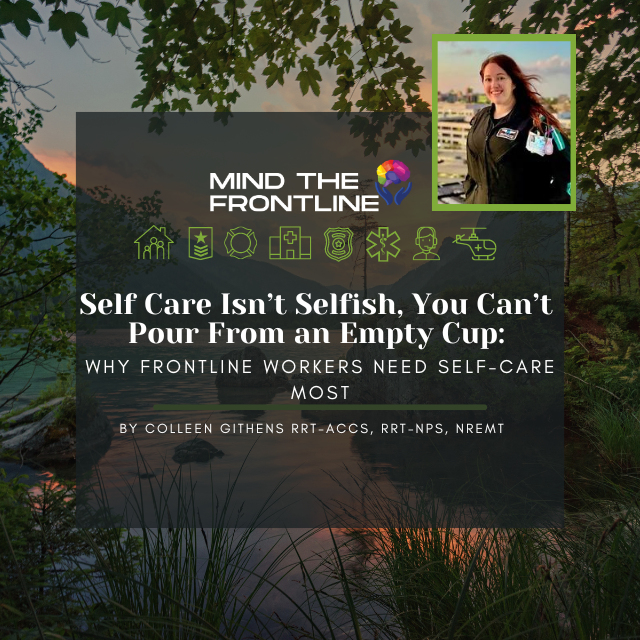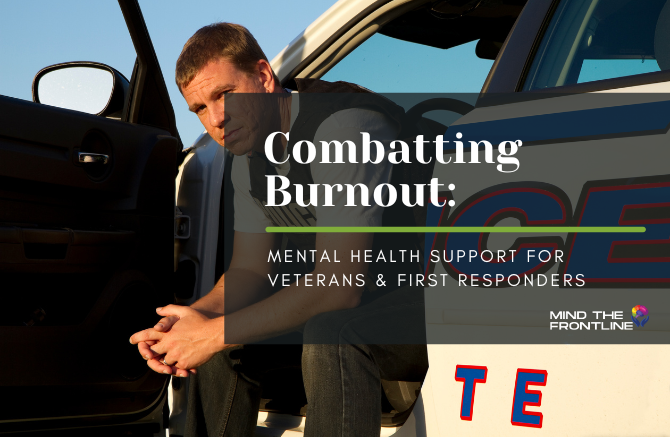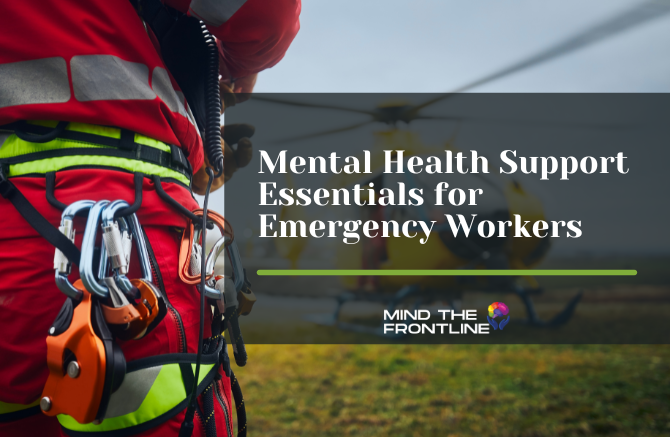Self-Care Isn't Selfish, You Can't Pour From an Empty Cup
We all know the saying, "You can't pour from an empty cup." This rings especially true for frontline workers – the firefighters, police officers,...
5 min read
 Chris Smetana, AS, FP-C, CCP-C, NRP | Founder/President
:
Jul 2, 2024
Chris Smetana, AS, FP-C, CCP-C, NRP | Founder/President
:
Jul 2, 2024
-1.png)
Discover essential strategies for frontline workers to achieve work-life balance and succeed in their demanding roles.
In addition to setting priorities, another key strategy for frontline workers to achieve work-life balance is to practice effective time management. By honing your time management skills, you can optimize your productivity and ensure that you are making the most of your workday. Start by breaking down your tasks into smaller, manageable chunks and allocating specific time slots to work on each task. This will help you stay focused and avoid feeling overwhelmed by a long list of responsibilities.
Furthermore, incorporating time-blocking techniques into your schedule can help you create dedicated blocks of time for different types of tasks, such as administrative work, client interactions, and personal activities. By segmenting your day in this way, you can maintain a clear structure and prevent tasks from bleeding into each other. This can also help you establish boundaries between work and personal time, making it easier to switch off and unwind at the end of the day.
Additionally, utilizing technology tools such as calendar apps, project management software, and time-tracking applications can streamline your workflow and make it easier to track your progress on various tasks. These tools can help you stay organized, set reminders for important deadlines, and identify areas where you may need to adjust your schedule to stay on track.
By combining effective time management strategies with setting priorities and learning to say no, frontline workers can create a solid foundation for achieving work-life balance and preventing burnout. Prioritizing tasks, managing time effectively, and setting boundaries are essential skills that can help you navigate the demands of your job while also making time for personal well-being and relationships.

Frontline work can be demanding and stressful, which makes self-care practices crucial for maintaining work-life balance. Implementing self-care routines can help reduce stress and promote mental and physical well-being. Start by identifying activities or practices that help you relax and recharge. This could include exercise, meditation, spending time with loved ones, pursuing hobbies, or engaging in activities that bring you joy.
It's important to prioritize self-care and make it a regular part of your routine. Schedule time for yourself and treat it as an essential appointment. Remember that self-care is not selfish but necessary for your overall well-being. By taking care of yourself, you will be better equipped to handle the demands of your job and maintain a healthy work-life balance.
-1.png?width=307&height=200&name=Blog%20Section%20Pictures%20(6)-1.png)
Effective communication is vital for frontline workers to successfully balance job demands and personal life. Improving your communication skills can help foster work relationships and manage expectations. Start by actively listening to your colleagues and superiors. This means giving your full attention, asking clarifying questions, and showing empathy.
Additionally, practice clear and assertive communication. Be open and transparent about your needs, boundaries, and availability. Clearly express your priorities and limitations to your team members and supervisors. This will help set realistic expectations and prevent misunderstandings.
Finally, don't forget to communicate your personal life commitments and responsibilities. Let your colleagues know if you have family obligations or personal events that might affect your availability. By being open and proactive in your communication, you can foster understanding and support from your work environment.
-3.png?width=307&height=200&name=Blog%20Section%20Pictures%20(2)-3.png)
In the fast-paced world of frontline work, adaptability is a crucial skill that can make all the difference in maintaining a healthy work-life balance. Embracing change as an opportunity for growth rather than a disruption sets the foundation for success in navigating unpredictable work environments and schedules.
To cultivate adaptability, it's essential to develop practical strategies for handling unexpected events or shifts in your schedule. This could involve creating contingency plans, honing your time management skills to prioritize tasks effectively, and remaining open to adjusting your routines as needed. By proactively seeking solutions to challenges that arise, you empower yourself to face the uncertainties of frontline work with resilience and confidence.
During times of change, it's important to practice self-compassion and acknowledge that not everything will go according to plan. Remember to be kind to yourself and recognize that you are doing your best in a demanding and ever-evolving environment. By embracing adaptability and maintaining a positive mindset, you can navigate the twists and turns of frontline work with grace and determination.
-3.png?width=307&height=200&name=Blog%20Section%20Pictures%20(3)-3.png)
Work-life integration is about finding harmony between your work responsibilities and personal life to prevent burnout and enhance overall satisfaction. It's important to recognize that achieving a perfect balance between work and personal life may not always be feasible. Instead, focus on integrating the two in a way that allows you to meet your professional obligations while also prioritizing your personal well-being.
One strategy for work-life integration is setting boundaries. Clearly define your working hours and strive to maintain them. Avoid excessive overtime and prioritize time for yourself, your family, and your hobbies. Communicate your boundaries to your colleagues and supervisors to ensure that they are respected.
Another important aspect of work-life integration is being present in the moment. When you are at work, give your full attention and focus on your tasks. Similarly, when you are spending time with loved ones or engaging in personal activities, be fully present and avoid distractions from work. This will help you maintain a sense of balance and prevent work from encroaching on your personal life.
Finally, don't forget to take breaks and recharge. Schedule regular breaks throughout your workday to rest and rejuvenate. Use your vacation days to disconnect from work and spend quality time with your loved ones. By taking care of your personal well-being, you will be able to bring your best self to both your job and personal life.
-3.png?width=307&height=200&name=Blog%20Section%20Pictures%20(4)-3.png)
Finding a balance between work and love is a common struggle for many frontline workers, but it doesn't have to be an impossible feat. One effective strategy to achieve this delicate equilibrium is by actively involving your partner in your daily routine. By including your significant other in your job demands and openly communicating about your schedules and responsibilities, you can create a sense of shared understanding and support.
Discovering ways to carve out quality time together, even if it's just a few minutes each day, can make a significant difference in nurturing your relationship. Whether it's enjoying breakfast together, taking a leisurely walk, or simply sharing a meal, these small moments of connection can strengthen your bond and foster a sense of closeness.
Consider establishing rituals or traditions that you can partake in together on a regular basis. Whether it's a dedicated weekly date night, a monthly adventure, or a shared hobby that brings you joy, these shared experiences can deepen your connection and provide a sense of stability amidst the inherent demands of your work life.
In addition, practicing empathy and understanding towards your partner's needs and challenges is essential for cultivating a supportive and harmonious relationship. Actively listen to their concerns, offer your unwavering support, and be there for them during their own work or personal struggles. By prioritizing your relationship and integrating your partner into your daily routine, you can lay a strong foundation of love, trust, and mutual support that will sustain you through the highs and lows of frontline work and personal life.
-2.png?width=307&height=200&name=Blog%20Section%20Pictures%20(5)-2.png)
Explore many valuable First Responder Mental Health and Wellness resources on Mind the Frontline's online platform. Discover the link below to access a wide range of support and information tailored specifically for first responders.
Additional Mind the Frontline Resource's
Stay connected with Mind the Frontline on Facebook & LinkedIn.
$50 off code:frontline40
Empower your employees with Mind Shield for Organizations, a comprehensive membership program designed specifically to support the mental health and wellness of first responders. With memberships ranging from $25 to $45 per employee, Mind Shield offers a suite of resources tailored to enhance the resilience and well-being of those on the front lines.
Key Features and Benefits:
Mind Shield Peer Support LMS™: Equip your peer support team with our Learning Management System, designed to streamline and enhance the delivery of peer support.
On-demand and Virtual Continuing Education: Access a wide range of peer support continuing education options that fit the schedules of busy first responders.
Comprehensive Resource Directory: Utilize the largest online directory of first responder mental health and wellness resources.
State-specific Resources: Easily access mental health, wellness, and recovery resources categorized by state.
24/7 Debrief Hotline: Benefit from around-the-clock support with the MindShield debrief hotline.
Virtual 1-on-1 and Group Support: Engage with virtual peer support, available both one-on-one and in group settings, to provide flexible assistance.
Preferred Provider List and Discounts: Take advantage of a curated list of preferred mental health providers and receive discounts on various mental health resources, including innovative tools like Bi-Tapp.
Educational and Supportive Content: Gain access to weekly blogs, podcasts, videos, healthy recipes, fitness routines, and more to support lifestyle balance and mental wellness.

We all know the saying, "You can't pour from an empty cup." This rings especially true for frontline workers – the firefighters, police officers,...

Discover effective strategies for veterans & first responders to combat burnout and prioritize mental health support

Emergency workers face immense stress and pressure, especially during natural disasters. This blog explores essential strategies and support systems...